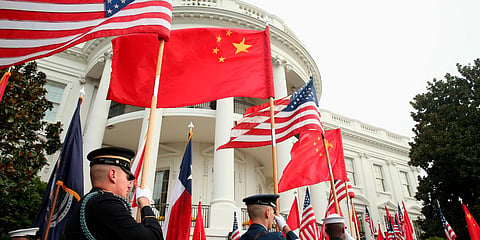

The much awaited signal event, the first conversation between US President Joe Biden and Chinese President Xi Jinping, came to be this Thursday. The readout of the two hour Biden-Xi dialogue, where Biden raised hackle points of Taiwan, Xinjiang and Hong Kong is as yet open to interpretation and all bets are off.
The beauty about the Cold War was that the principal players kept the heat on simmer, under control beyond the thrusts and parries of rhetoric. The emerging face-off between the United States and China has all the portents of a tense future.
Verily, the tussle for supremacy has geopolitical consequences and will inform and influence the new world order. The US and China account for over a third of the USD 85 trillion global GDP and nearly a trillion dollars in military spending. It is early days as yet.
Regardless of whether the US-China stand-off acquires a competitive or confrontational countenance, the two countries will define supremacy competing in technology, military power and trade besides other areas in the coming years. Common sense says when mammoths battle, the brunt of collateral damage will befall those caught betwixt.
Interestingly, or serendipitously if you please, a day before the Biden-Xi talks, PM Narendra Modi invoked the spectre of transition into a new world order in Parliament while articulating the need to accelerate the pace of change to ensure India its place in the emerging world order.
It is true that domestic resilience matters. It is equally true that sustaining this resilience demands leverage in an interconnected world. The challenge and opportunity for India is to build a coalition of similarly placed economies and like-minded democracies.
In January, India was accorded the status of 'special invitee' to G7 in recognition of its growing stature. The acknowledgement and recognition of its potential affords India the stature to lead the initiative to create a bloc which represents the cause of strategic autonomy.
There are 13 countries including India, functioning democracies all, accounting for USD 27-trillion plus in GDP, six of them USD 2 trillion plus economies and seven aspiring to get there, who could be constituents of this block. These include Japan, Germany, the UK, France, Brazil, Italy, Canada, South Korea, Australia, Spain, Mexico and Indonesia.
There is economic clout and common concern which could be the binding glue. The emerging proposition of the alternate order resting on the troubling totalitarian axis of China and the fluid ambiguity of Russia when juxtaposed with the descent into dysfunctional isolationism of the US presents a spectre which is worrisome. That said the emerging chaos presents silhouettes of possibilities - to be engaged in meeting challenges and to stay interconnected in emerging opportunities.
Each of the 13 countries is both a consuming and a producing economy, visible in agri and industrial produce markets, rich in human and natural resources, moving rapidly towards algorithmic automation and is entrenched in the supply chain.
The pandemic brought home harsh lessons in resilience - over a fourth of the USD 4 trillion-plus global trade could shift supply base by 2025 within this grouping. There are opportunities galore for competition and collaboration.
Challenges to economic and national security brought together an undeclared coalition dubbed Five Eyes on the Huawei question to pave the way for induction of 5G. The ossification of the UN Security Council created the G4 - Brazil, India, Germany and Japan - to push for representation reforms.
A similar approach will be needed to confront vexing questions - from data management to offshoring of legit tax revenues.
The history of the phraseology of 'the new world order', in its current contextual construct, grounded in the rule of law, can be traced to Tsar Alexander I who in 1814 conceptualised the idea of an international system.
A century later, in 1919, Woodrow Wilson deployed the catch-all composition 'new world order' in the run up to the formation of the League of Nations. In 2021, it is manifest that the post war 'Wilsonian world order' is unravelling - particularly following the collapse of the Soviet Union.
There is some basis for the perception that the institutional architecture has been bent to serve ill-conceived notions and illegitimate mandate of hegemons. The UN, it has been argued for long, is a hostage of the fossilised Security Council. The G7 bloc of industrialised nations accounting for over half the global wealth, set up in 1975 following the 1973 oil crisis is around but comes alive only during financial crises.
And the G20 set up in 1999 has been memorably described as 'G-Zero' by the cognoscenti. It is apparent that the structures meant to enable the rule of law are stultified and have been reduced to instruments of expediency rather than the intended platforms for ensuring equity and efficiency.
In 1939, HG Wells in his tome, The New World Order, said "The new order will be incessant; things will never stop happening." The world has since become far more complex. The belief that freedom of will and free market is the road to peace and prosperity is challenged relentlessly.
The G2Trillion group can scarcely afford the consequences and must come together. As the largest free market democracy, India has much at stake and will have to pave the path.
(The writer is author of The Gated Republic, Aadhaar: A Biometric History of India’s 12 Digit Revolution, and Accidental India. He can be reached at shankkar.aiyar@gmail.com)